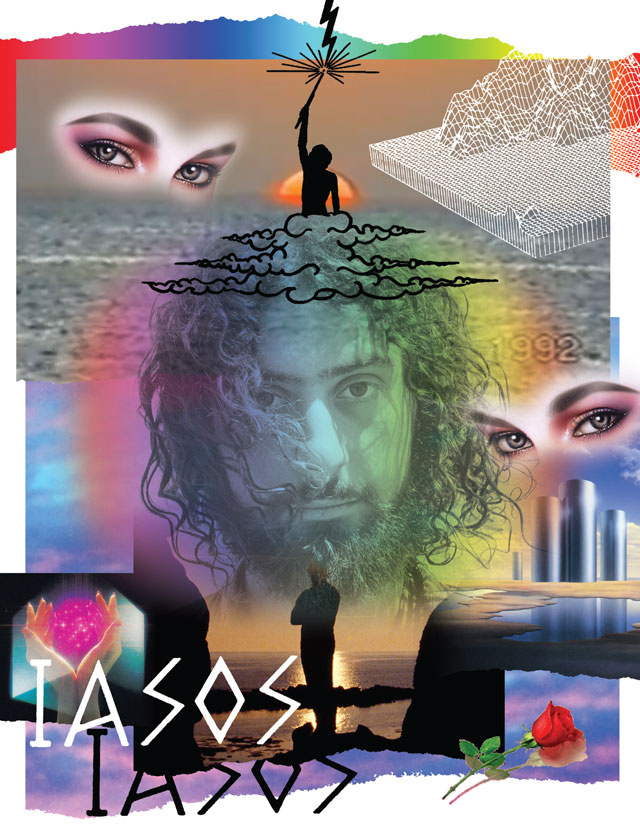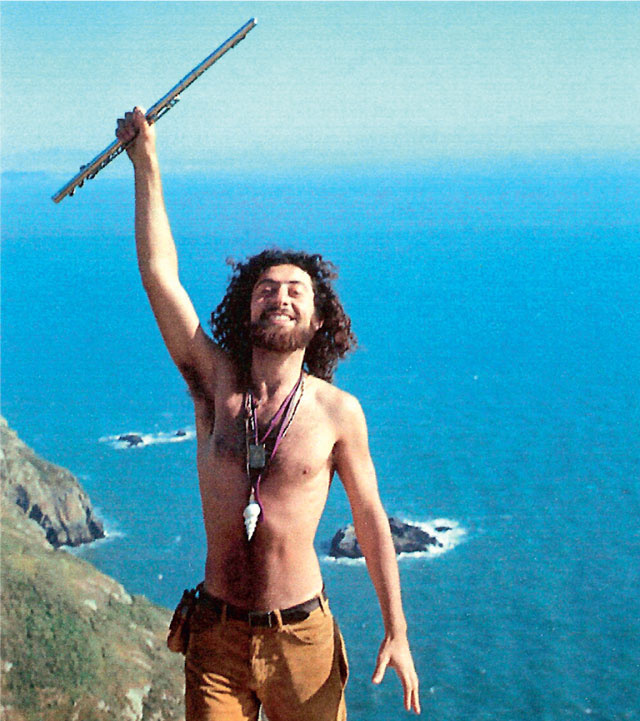
ΔΙΑΦΗΜΙΣΗ

Iasos: I’m fantastic! I just came back from a concert in Los Angeles and it couldn’t have gone better! It was sold out; standing room only. It was a young, playful crowd. There were a lot of beaming, happy faces. I had quite a time. Do your concerts always go so well?
The one before, in Portland, Oregon, was even better. You see, I measure the dramatic impact I have on the audience by how much stillness there is when I take a bow to signify that the concert is over. Because if they really get it, they’re really zoned out and no one gets up. In Portland it lasted so long it was almost embarrassing. I bowed to signify it was over and then I went to the front of the stage and nobody got up. Then one minute went by and nobody got up, there was silence. Two minutes after, six minutes after… I thought this is too much and walked into the lobby and that broke the spell. A lot of people will encounter Iasos for the first time through Celestial Soul Portrait, which shines a light on your earlier work. Is there renewed interest in your music?
It’s funny you say that. Ever since I started, my close friends have always said, “Iasos, you’re way ahead of your time.” And now that it’s 2013, people are getting interested in music I released in 1975. So it kind of verifies them saying that. I have to say it’s encouraging to hear you talking like a completely normal person. Having seen photos of you and listened to your music, I had the impression you’d be a pretty zoned-out individual.
[hysterical laughter] That’s very funny! It’s funny that you expected me to be zoned-out. I am grounded and present. What was your state of mind in 1975 when you were making your first album, Inter-Dimensional Music?
Same as it is now! I’m trying to externalize the musical visions I’m getting in my mind, which are very heavenly and paradise-like. In those days I did it with acoustic instruments that were electronically processed. Nowadays there is all sorts of software to do all sorts of outrageous things with sound. So I’m just taking advantage of whatever technology is available at the time, to get as close as I can to an approximation of what I’m hearing in my mind. You’ve devised a kind of “paradise range” for your music, a celestial scale. How did you come up with this?
You don’t know the story? I might have heard it, but it would be good to hear it from the horse’s mouth, as it were.
I started learning piano when I was eight years old, and I took flute lessons when I was ten years old. My formal training was only grade school and high school, and after that I was self-taught. I reached the point where I could play flute along with classical music and figure out the chords, so I learned a lot about chords and harmony that way. And then at a certain point in the early 70s I started spontaneously hearing a certain type of music in my mind. I had no idea where it was coming from. It wasn’t anything like any Earth music, and it was uplifting and happy and full of love. It was so harmonious as to be unearthly, and it was full of unusual sounds. This was before there were synthesizers. Iasos and his flute salute the sky at Big Sur, California. Photo courtesy of Numero Group. When you say “Earth music,” what do you mean?
The kind of music you hear on planet Earth. It wasn’t like any of it. I had no idea how to create this, and then a voice in my mind said, “You can do this!” And I trusted it, so I started working on it. Then about two years later I had a profound spiritual experience where I was doing automatic writing with this spiritual teacher. Whenever I did this with her she would say, “You will now write with so-and-so”—typically it would be some ascended master, like, “You will write with Hilarian or Saint Germain.” And after just a few minutes of writing, I would sense their unique personality. When she said, “You’ll now write with Vista,” I’d never heard of him, so I just started writing. After a few sentences, I sensed his personality and the instant I did there was a flash of cognition that went through my mind. BLAM! Suddenly I remembered a whole bunch of stuff. I remembered that this being, Vista, had made an agreement with me before I was born. The agreement was that I would incarnate on planet Earth, I would become proficient in music, and then he would transmit musical ideas and later visual ideas into my mind, and I would do my best to externalize them so that other people could benefit from it. OK! And how do you picture Vista?
When you reach that level of consciousness, form is optional and flexible. There’s no particular form. However, I sense his unique personality, his soul, his heart. Can you communicate with him at any time, or is the connection strongest when, say, you’re working on music?
I invite him when I work on music and I invite him to influence me when I’m doing live concerts also. It’s more a one-way thing where he transmits ideas to me, although there have been a few wild exceptions where I asked for something and got it really immediately in a very dramatic way that blew me away. What happened?
Once before a concert I was backstage tuning in to Vista and I said, “Vista, I would love to experience your energy more vividly than usual.” To my surprise, maybe two and a half seconds after I put out that telepathic request, suddenly—BZZZTT!—he transmitted an unbelievably concentrated beam of visual patterns from his third eye into my third eye. Now, imagine 30 hours of the most glorious visuals you’ve ever seen, continuously flowing and changing and evolving and undulating and morphing. And then imagine squeezing all that into about one second. Sounds like an intense LSD trip.
I wouldn’t say it was similar to that. This was very concentrated. How receptive was the Los Angeles music industry to the records you were putting out in the mid to late 70s?
That’s a joke. They weren’t receptive at all. Before my first record came out, I remember going to big record companies like Columbia Records in San Francisco to play them the music I wanted to release, and they would laugh at me because they couldn’t get it. This was before new age music existed. They couldn’t see a new success formula in music that would work. They only knew success formulas that were already working. So they’d laugh at me, saying, “Where’s the beat? Where’s the catch? Where’s the lyrics?” They didn’t understand it at all. That’s all fine, I did it in an alternative way. When you heard of other people making similar music to you in the 70s, did you reach out to them, or did they get in touch with you?
Well, I live in Marin County, and the new age sort of started in America, and in America the new age started in California, and in California the new age started in the Bay Area, and in the Bay Area the new age started in Marin County, so I was in the center of the vortex. I had a lot of friends in Marin County who were spiritual teachers, and friends who were musicians and friends who were visionary artists, all in the new age field. Have certain life events informed your work, or has the music of others influenced you at all?
It had very secondary, minor effects. For example, I like Jimi Hendrix; I like his magnificent ability to weave melodies. I like the rhythms in Santana. I like the lush textures in Martin Denny’s music. I like the classical chords in Ravel and Debussy and Respighi. There have been some influences, but over 90 percent of it is what I’m getting internally. Do you keep abreast of modern electronic music? There’s a lot of new new age-style music floating around these days.
I’m very ignorant about it except for what people share with me. I’m not looking for it because I’m too busy creating my own. I don’t need that external influence as I’m getting ideas internally. Did you listen to Brian Eno or Vangelis in the 70s? They were your contemporaries in the world of progressive electronic music.
I heard their music and I like Vangelis—some of his stuff is heavenly. He covers a wide range emotionally, whereas I’m focused only on the blissful part of it. Eno was very creative and very spacey. I don’t especially resonate with it, but I respect him very much as a musician. Do you fear death?
Well, my girlfriend asked me the same question and I gave her the same answer: part of me does and part of me does not. The physical body has its own consciousness and it’s programmed to stay alive no matter what, so my physical body has an extreme fear of death. But my soul does not fear it at all because I know it’s from where I came from in the beginning, a wonderful, loving space. So part of me is afraid and part of me is not afraid at all and they both coexist happily together.
ΔΙΑΦΗΜΙΣΗ